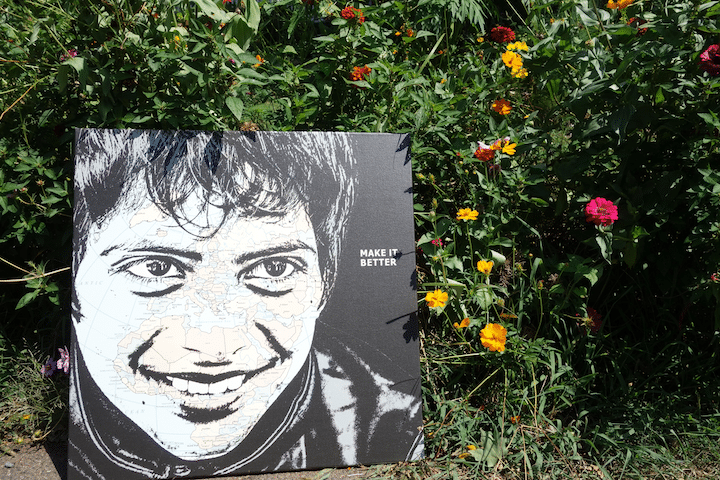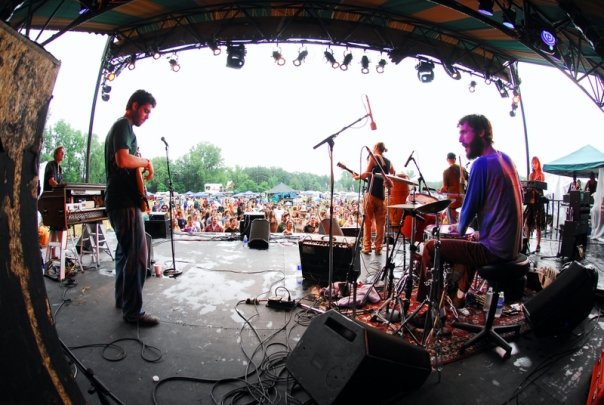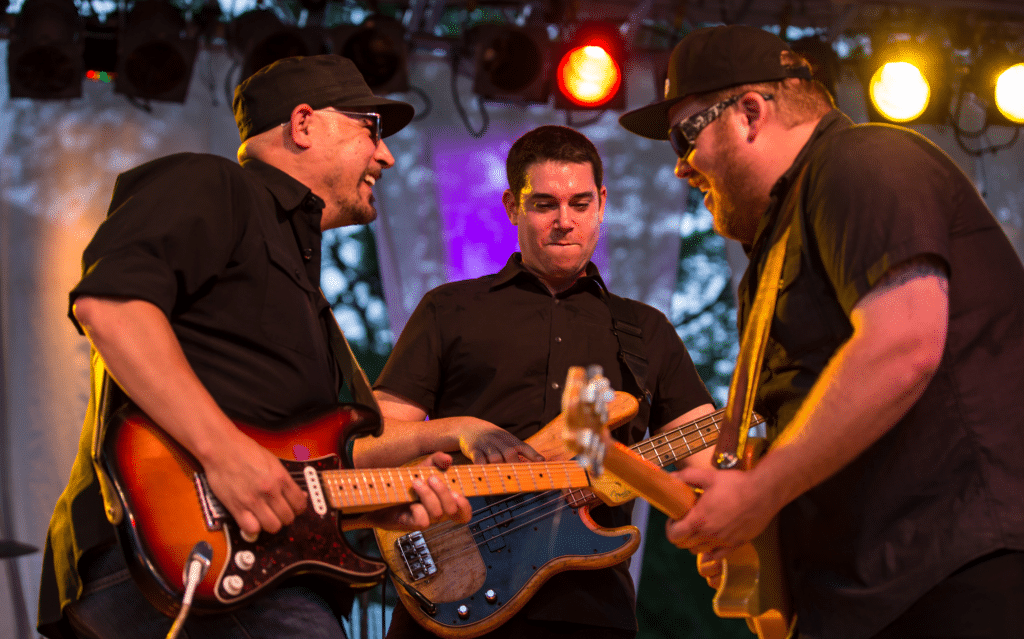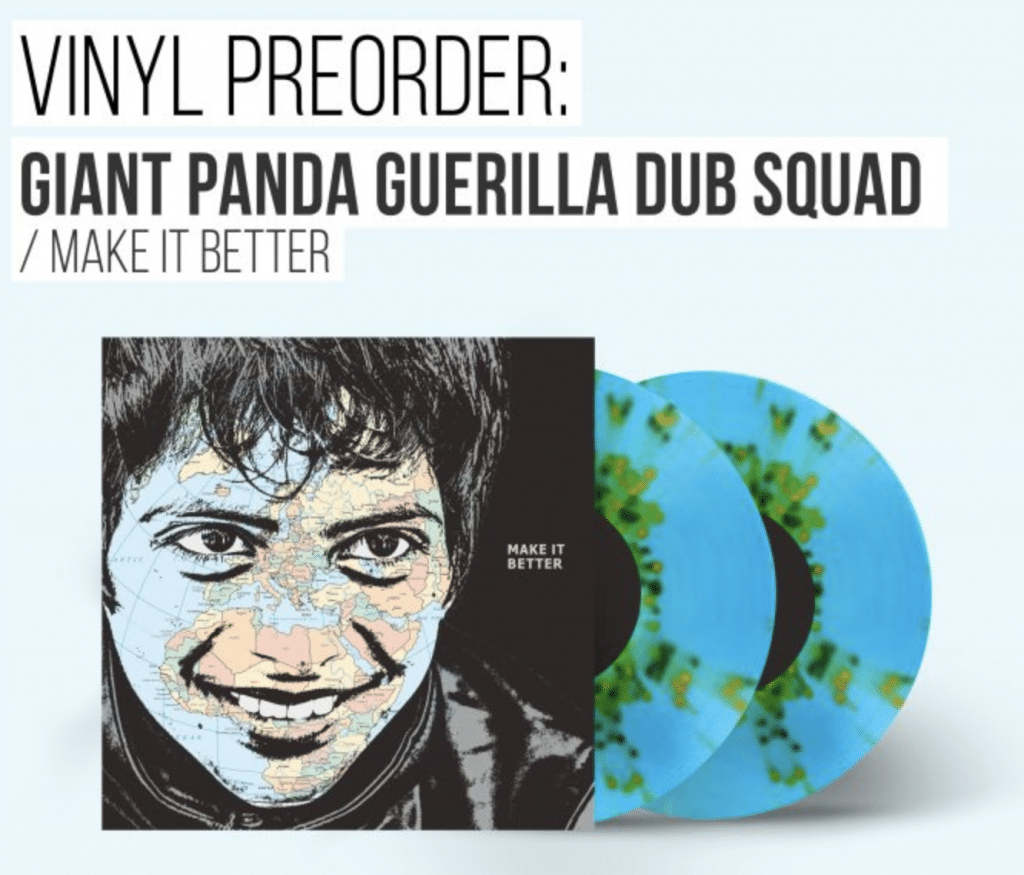September 16 marked one year since the release of Giant Panda Guerilla Dub Squad’s Make It Better, the band’s sixth studio release. Topping at #1 on both the Billboard and iTunes reggae charts, the quality of this latest release is a true testament to the grit and talent that pours from Panda. Make It Better was also the third release from us here on Rootfire Cooperative.
In partnership with feedbands.com, Rootfire Cooperative is excited to commemorate the one-year anniversary of Make It Better by releasing the record on vinyl for the first time. We recently sat down with GPGDS’ James Searl to talk about the process of working with the Cooperative, music in the Northeast, and longevity in the music business.
Rootfire: A lot of readers might not realize how deep the connection between Rootfire and Panda is. Take us back to the early days — how did the connection begin?
James Searl: Seth Herman [founder of Rootfire] was the first manager I ever had as a band member. We were 18 (he was 17?) and from the get go he was trying to improve the lives of the musicians he knew. It was clear that he really appreciated what music did for people and he wanted to facilitate. I remember that he paid me for a gig with an official band business check for something like $17.84 and I thought it was ridiculous, but the joke was on me to laugh. He was taking the business of music very seriously while the rest of us were pretty much just screwing around. I left that particular band but I was impressed to see him continue to take music so seriously as a non-musician.
My connection to Seth was through Matt Goodwin, one of my favorite musicians, best friends, longtime collaborator and travel buddy. Matt was always a step ahead of the game as a player, and I remember getting the call from Nate Richardson personally, as he was looking for Matt Goodwin to replace him in John Brown’s Body, which was by far and away both of our favorite band at the time. Seth soon became the manager of John Brown’s Body and it was him and Goodwin that managed to get JBB to take Giant Panda seriously as a band, despite my many emails trying to get us on as a support band. Rolling with JBB around the country a few times really taught us the ropes of how to grind as touring musicians. Seth called me one day and convinced me to let him take over management. He had an even better vision of what Giant Panda wanted to be than we did. He knew we were much more than a reggae band. He appreciated and saw value in our originality and versatility and he pushed us to embrace both of those things.
Seth was constantly innovating. He would have ten ideas at once. He saw how the music industry was changing and being from Naples, NY, he really understood the value of artisan, homespun, personal and even eccentric approaches to art as a commodity that people wanted to have. That all mixed in, of course, with a ton of hands-on hard work, which he always had a power of enlisting people in.
In a time when the traditional music industry was falling on its face, Seth brought a realistic small business approach to the digital music and live touring age that we are now immersed in. Most importantly, he was POSITIVE all the time without ever backing down to support artists and fight for fairness. He was cut-throat, with the bottom line being the human rights of the artists he was representing, while also being realistic.
Grassroots Festival – Ithaca 2008. Photo by Dave Bernis
So after awhile, we just started doing everything that Seth suggested. Even if we weren’t totally sure about the idea, we knew that he was.
After lots of twists and turns Seth finally called his company Rootfire. It had aim to be more of a lifestyle brand, revolving around soccer and reggae. Somehow we all understood that this made sense. He started asking me to write articles about reggae for the website. He asked Chris [O’Brian, drummer for GPGDS] to write about art that he loved. He linked up with photographers to share pictures of the scene and Rootfire organically brought about this network of people who really appreciate the community of community in the digital age. Because in reality, through music, we all meet up and enjoy our lives together. Music was the antenna that was bringing people together to solidify other kinds of relationships and friendships that would move on to yield additional beautiful creations like babies, businesses, and common belief systems, whether you were in Guam or Columbia or Rochester NY. That’s still what Rootfire is all about.
RF: You guys are from Rochester, and it kind of seems like there’s this whole little microcosm of amazing music, reggae and otherwise, coming from the region. What is it about Upstate NY that makes it such a crucial hotspot for the American reggae scene?
JS: I have always thought that it is the cold that makes it a hotspot for reggae. Rochester has always been original. We grew up seeing original bands and in our lifetime there has always been original reggae in the region. For me though, cooking up reggae rhythms in basements in the winter time is kind of the only thing to do. Some friends go bowling, some make reggae. Bass makes it feel warm. Tube amps. That and the lineage of bad ass players that came before us and inspired us, like any band that Dylan Savage was in, John Brown’s Body, the Buddhahood, and the many bands that Frank Bohem and Jim Schwartz were in.
RF: Make It Better has been out for a year now, released with the help of a zero-interest microloan from the Rootfire Cooperative, and debuting at the #1 spot on the Billboard reggae chart. Reflect for a moment on the role of funding for a band looking to cut an album. What is the impact of having an organization like the Cooperative step in with the offer of a zero-interest loan?
JS: So on the phone during a group meeting one day I was bitching about how awful it is to have to go out and tour to make money, to only slowly fund the creation of a record. It was agonizing as a songwriter to put out an album 3 years after the drum tracks were finished. The only holdup was money. Seth, who had moved on from being our day to day manager and was on to bigger ventures, like throwing festivals and running a website, nonchalantly said “oh, that’s just a money thing, it’s like an equation, we can figure out how to get it so the band can just go in and record it and it’s done.” Previously we had worked out record deals where the manufacturing, marketing, and distribution costs were fronted and then we would collect 50% of the profit after the loan was recouped, which in the bottoming out of the record industry, was still a great deal for a band like us. However, you still needed to deliver a fully complete record before that money could be negotiated and that was the problem I was trying to solve.
“Oh REALLY!?” I kind of snapped. This was literally the issue that constantly plagued our band and he thought he could just solve it like a math problem?
“Yeah let me think about it,” he said.
Anyways, he did the math and said he thought he could secure the money from Rootfire based on the idea that the loan could be paid back if we borrowed a year’s worth of what our previous album sold from its release. Unfortunately albums were not flying off the shelf, what with streaming and illegal downloads, but it was a number that we could work with to probably start and finish the recording process.
There was a catch, he said. We would probably have to pay interest to Rootfire on the loan since it was so much money coming out of the business.
Chris and I were kinda like fuck that. Interest is something that banks practice. It’s a way to make money off of money and it’s sinful in most major religions. We would rather borrow money from a friend if it came to that (also something we were always very hesitant to explore since albums can take a long time to recoup). Why would the team we work with, who ultimately makes money off of us, also be making money off of our shitty financial situation?
And that was kind of the thing. Interest is just something that people always think has to be taken into consideration when lending money. It’s become commonplace in business. We understand the details of why people do it, but we didn’t feel that this was one of those situations. We were just trying to make an album to further our discography and career. Surely that could be understood in the context of music and arts sake.
A few days later, Seth came back to us and said that, in fact, the idea of interest should not be taken for granted, and that Rootfire and Ineffable (who had become partners) should be wanting to nurture their artists and be helping them to create as much music as possible at the artists pace, without making money off of the difficult place bands are financially in.
Making albums costs tens of thousands of dollars. There is just little to no way around that. It’s unfortunate that consumers don’t take that into account. To be on the road and supporting its members while paying the bills is hard enough, let alone finding a way to save an additional $30+ thousand dollars to record a new record to tour on.
Dylan Savage, James Searl, Dan Keller – Rochester 2017. Photo Courtesy Aaron Winters
Seth took it a step further though. He included in the Rootfire Cooperative pitch that the loan would cover ALL that was needed to get an album on the shelf. From the first note recorded to the artwork and layout to the distribution. It would be different and custom to each project so that no one was biting off something they couldn’t chew. The goals were ambitious but realistic.
Furthermore, once the band paid off the loan they would keep 100% of the profit immediately. That was unheard of in the industry. That was truly something that no one else could compete with. That was the idea, and though it may change from project to project, this was ultimately the goal.
We are extremely proud of the work that Rootfire Cooperative has done to get some beautiful albums off the ground. Each album is approached differently and it was a great process for us to be able to just go into the studio and just do our work without having to stop because of a lack of finances. We look forward to future Rootfire releases and innovations within the Cooperative.
RF: Finally, how does the big picture game shift for a band like GPGDS that has been around for 13 years with six studio albums and two live releases? Does the focus stay strictly on the music? Do you have some words of insight for the up and coming generation of musicians and songwriters?
JS: Clinton Fearon told us to always keep creating. He is in his 60’s and writing some of our favorite music and his best IMO. In a society that worships youth culture, I think it’s important to remember that a lot of people who keep up the craft end up doing their greatest work later in life. They make it better. I think we try to tell ourselves that. Also, people leave or don’t click anymore. We have had a number of people come in and out of the group and you have to just let that be when it happens. Seth has actually left the business, which is a very Seth thing to do, as he grows and innovates in his creative life and process. Shift. It’s all good. The Rootfire Cooperative is a beautiful thing that he started and we are in the best hands with our manager Reid Foster at the wheel, who was born to be in the place where he is.
That’s part of it. You gotta keep moving and adjust to other people’s life changes because you are working with a group and sometimes the group has to shift. It’s magically organic in fact.
Music is always life’s reflection but it is easy to get drawn away from the process through life distractions, or feel like you are not relatable. At least that is something I know I have to psyche myself out of. Keep writing, keep reflecting, keep recording, stay friends. If you fall out, take some time and fall back in. You may be born an artist but you have to keep grinding to stay one.
PRE-ORDER your copy of Make It Better here!
*Orders are expected to ship January 2018. Good things take time.
[gravityform id=”36″ title=”false” description=”true”]




